Office of Police Oversight: 2019-2020 Annual Report
Office of Police Oversight presents the inaugural annual report about our work from January 2019 to December 2020.
Contact Information
Office of Police Oversight |
Main office:(512) 974 - 9090
Complaint and thank-you hotline: (512) 972 - 2676
|
Introduction
Introduction 1 of 3
Message From The Director
It is my privilege to present the inaugural annual report for the Office of Police Oversight (OPO).
Since November 15, 2018, when OPO was formally established by city ordinance, we have worked diligently to fulfill our mission to provide impartial oversight, increase transparency, and create sustainable community partnerships. I could not be more pleased with what OPO staff has accomplished and thankful for the continued support from city management, the city council, and our community.
Civilian oversight is crucial to maintaining a balance between the need for public safety and the rights of individuals who interact with police. Over the last two and half years, we have built three divisions aligned with our core mission and purpose: Complaints, Community Engagement/Communications, and Policy/Research. We have taken a holistic approach to oversight that prioritizes communication, collaboration, and a more robust commitment to accountability. This new approach reflects the culture and beliefs of our diverse Austin community.
We have recognized that civilian oversight cannot and should not be limited to just investigations of police misconduct. Effective oversight and improvements in policing must be coupled with data, research, and community input. These areas are necessary for positive and sustainable change that benefits both our community and the police department. Our office motto is “Excellence is the Expectation!” and our commitment to excellence will continue in our work.
It is my honor to serve as the Director of the Office of Police Oversight, and I am humbled by my team's commitment to this challenging work, their tenacity, and passion. As a team, this report highlights our achievements and accomplishments.
I am so proud that OPO is a national model for civilian police oversight and proof that effective oversight can lead to systemic change.

Farah C. Muscadin, JD
Director, Office of Police Oversight
Introduction 2 of 3
Executive Summary: OPO’s 2019–2020 Annual Report
The Office of Police Oversight (OPO) was established on November 15, 2018. The purpose of this report is to document and share OPO’s activities and achievements over 2019 and 2020.
OPO’s mission is to provide impartial oversight of the Austin Police Department’s conduct, practices, and policies to enhance accountability, inform the public to increase transparency, and create sustainable partnerships throughout the community.
Providing Impartial Oversight to Enhance Accountability
OPO worked to provide impartial oversight of APD to enhance accountability by improving on and creating new standards. For example, ensuring that community complaints were processed promptly and subsequent investigations by APD were conducted thoroughly and fairly. Additionally, in 2019, OPO launched a redesigned website to take online complaints or thank yous and post community member complaints.
In 2020, OPO also sent formal objections to APD. In one objection, OPO highlighted issues that arose during an investigation into officer misconduct and recommended areas for improvement. In another objection, OPO challenged APD's decision to decrease discipline for violations of body-worn camera and dash-camera policies.
In 2020, OPO worked to enhance accountability by participating in the creation of APD's policy on critical incident videos. APD has released three critical incident videos to the community, and OPO has been involved in creating and consulting on the production with APD.
Informing the Public to Increase Transparency
In 2019 and 2020, OPO worked with the Equity Office and Office of Innovation to publish two joint reports analyzing APD’s racial profiling data. These reports serve as a baseline to measure the effectiveness of citywide efforts to eliminate racial disparities in traffic stops. OPO also published its first officer-involved shooting report in 2020, which analyzed all APD officers' incidents in 2018.
In 2020, OPO collaborated with the University of Texas School of Law to create a course for the APD Training Academy on the history of race and policing both nationally and locally. This course will now be taught as part of the Training Academy curriculum.
OPO works closely with the Community Police Review Commission (CPRC) to increase transparency. The City Manager appointed this group of community volunteers who, among other things, can make policy recommendations related to APD and OPO and review critical incidents APD has investigated.
Creating Sustainable Partnerships
In 2019 and 2020, OPO continued to focus on building and nurturing partnerships in a way that prioritized equity, empathy, and direct connection. For example, OPO made significant changes to its website, media, and written materials to improve ease of access and address issues like language and digital access. These changes involved creating the Know Your Rights video series in seven languages, conducting user accessibility testing for the OPO website, and ensuring the OPO website was mobile-friendly and searchable.
OPO also engaged with the community through signature programming. OPO instituted community office hours in neighborhood libraries and recreational centers throughout all 10 City Council Districts. OPO also began hosting a semi-annual Community Leaders Breakfast to invite the public to learn more about OPO’s work and connect with leaders throughout the community.
OPO is committed to continuing excellent work and increasing transparency and accountability. The past two years have demonstrated that this work will continue to require OPO to build and expand while maintaining a solid foundation in the community. OPO continues to seek and implement opportunities for improvement to achieve our mission.
Introduction 3 of 3
OPO's Vision, Mission, and Strategic Direction
Office of Police Oversight (OPO) exists to serve the residents of Austin by enhancing a culture of accountability and transparency within policing.
Who We Are
Our vision: to enhance a culture of accountability and transparency within policing in Austin
5 common goals of police oversight:
-
Improving public trust
-
Ensuring accessible complaint processes
-
Increasing transparency
-
Deterring police misconduct
-
Promoting thorough, fair investigations
Mission Statement
Our new mission statement reflects input and feedback from the community.
The mission of the Office of Police Oversight is to provide impartial oversight of the Austin Police Department's conduct, practices, and policies to enhance accountability, inform the public to increase transparency, and create sustainable partnerships throughout the community.
Complaints
Complaints 1 of 8
Complaints Division
OPO's Complaints Division accepts complaints and thanks about police conduct.
Introduction
The Office of Police Oversight (OPO) provides independent, impartial oversight over the Austin Police Department (APD). OPO and APD are separate departments within the City of Austin. OPO is made up of civilians with oversight, legal, policy, and community engagement expertise. OPO’s role and responsibilities are outlined in:
- A municipal ordinance (click here) (PDF, 129 KB)
- The 2018 contract between the City of Austin and the Austin Police Association (click here) (PDF, 910 KB)
- A memo from the City Manager to the Mayor and City Council (click here) (PDF, 305 KB)
There are three divisions within OPO:
- Complaints
- Policy & Research
- Communications
Complaints Division

OPO's Complaints Division accepts complaints and thank yous related to Austin Police Department (APD) officer conduct. Community members can submit complaints or thank yous based on their own or someone else's experience. Anyone may contact OPO via phone, email, fax, U.S. mail, or the online form.
Individuals may submit complaints or thank yous anonymously. Before the 2018 Meet and Confer Agreement between the City of Austin and the Austin Police Association, anyone wanting to file a complaint about an APD officer was required to submit a signed and notarized legal statement (affidavit) documenting their complaint. Feedback from the community indicated this requirement had a negative impact and provided an almost insurmountable barrier to people coming forward about their experiences.
As a result, community members and activists advocated for the ability to file anonymous complaints. For example, the new OPO complaint form was co-created with community members and listed contact information last to clarify that this information was not required. Accepting anonymous feedback increases accessibility for community members who would otherwise be unwilling or unable to share their experiences.
OPO independently reviews every contact submitted to the office. OPO does not investigate complaints. APD investigates community complaints that they deem warrant an investigation.
OPO conducts oversight of each complaint from when a contact is submitted, to when an investigation is finalized. Oversight of a complaint includes:
- Conducting a preliminary review of the complaint
- Monitoring any subsequent investigation by APD
- Providing progress updates to the individual who submitted the complaint
- Communicating the results of an investigation once APD has made a final determination
Complaints 2 of 8
How Many Times Did Community Members Contact the Office of Police Oversight?
Contacts between community members and OPO can originate online, in person, or by phone, email, or mail. Contacts may or may not result in a complaint.
Providing both a positive and negative feedback loop is essential to building trust between the community and APD. The number of contacts and thank yous the OPO received in 2019, and 2020 are illustrated in the chart below.
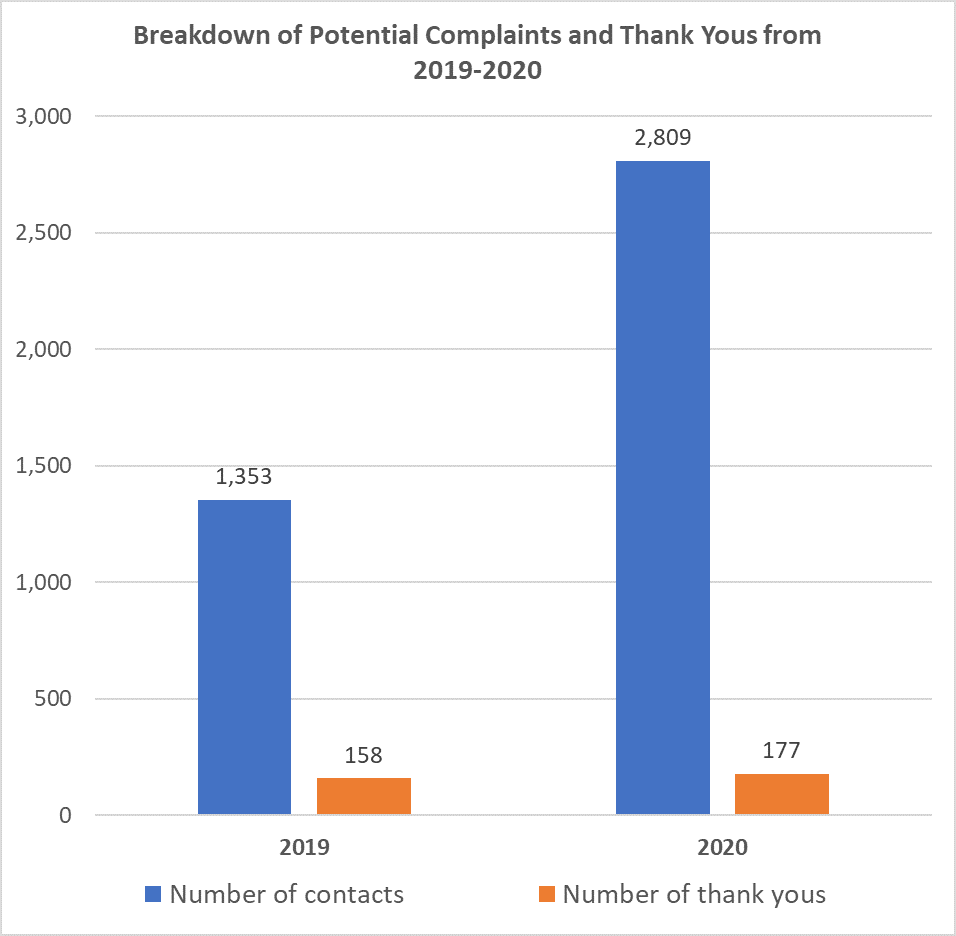
Note: The OPO saw a significant increase in the number of contacts in 2020 due to the protests against police brutality locally and nationally.


OPO staff reviews each complaint during the preliminary review and processes every contact in one of the following ways:
Not Applicable to OPO: OPO only handles complaints against Austin Police Department (APD) officers. Complaints that are not about APD officers do not apply to OPO.
Community Concern: Community concerns often lack the details needed for a formal complaint, such as time, date, and location. Community concerns can also be a more general concern about police behavior. OPO notifies APD of community concerns.
OPO Supervisor Referral: In some cases, the best resolution for a community member is to speak with an officer's supervisor. The APD supervisor will answer questions and address concerns from the community member. OPO notifies APD to contact the community member.
Formal Complaint: If OPO identifies potential policy violations during a preliminary review, OPO forwards the complaint to APD and recommends that APD investigate. APD determines whether an investigation will occur. OPO publishes redacted formal complaints on our website.
No Policy Violation: In some instances, OPO does not identify a potential policy violation. When no potential policy violation is identified, OPO notifies the community member, and the complaint is closed.
Complaints 3 of 8
How Are Complaints Investigated?
The Austin Police Department (APD) investigates complaints. There are two different types of complaints, internal and external. Internal complaints are complaints that APD initiates; external complaints are complaints that APD receives from the Office of Police Oversight (OPO).
OPO conducts oversight of investigations into both internal and external complaints. Specifically, the OPO:
- Reviews information gathered by APD.
- Attends interviews conducted by APD.
- Provides progress updates to the individual who submitted the complaint.
- Recommends potential policy violation(s) and classification.
- Communicate the outcome of an investigation once APD has made a final determination.
APD is responsible for determining the classification of each investigation:
Class A complaints are the most serious allegations that APD investigates. These may result in discipline up to and including indefinite suspension.
Class B complaints are less serious allegations that APD investigates. These may result in discipline up to and including a 15-day suspension.
Class C complaints are allegations that do not qualify as Class A or Class B. APD generally does not investigate these complaints. Whether or not a Class C complaint is investigated, it is addressed through internal APD processes.
Class D complaints are allegations in which APD has determined there is no policy violation.
APD is responsible for determining the result of an investigation and making a disciplinary decision, OPO does not make any disciplinary decisions. The outcome of an investigation that APD has conducted are listed below:
- Sustained: The investigation reveals that the incident occurred and violated policy.
- Exonerated: The investigation reveals that the incident occurred but did not violate policy.
- Unfounded: The investigation reveals that the incident did not happen.
- Inconclusive: There is not enough evidence to show whether the incident occurred.
- Administratively Closed: There were no allegations, or there was no misconduct, the case was classified as a Class C or Class D complaint, or at the discretion of the Chief or their designee.
Complaints 4 of 8
OPO Objection to Changes to Investigative Process
OPO’s role in conducting oversight of investigations is not limited to individual complaints.
OPO also performs oversight of the investigative process as a whole and delivers objections and recommendations.
On March 13, 2020, OPO submitted an objection to the changes made by APD to General Order 902. General Order 902 specifically addresses administrative investigations. OPO objected to APD’s revisions because they undermine OPO’s ability to perform oversight and provide transparency to the public. Click here (PDF, 818 KB) for more information.
Complaints 5 of 8
How Many Complaints Were Investigated?
OPO does not investigate complaints. OPO forwards formal complaints to the Austin Police Department (APD) recommending investigation. APD investigates complaints that they deem warrant an investigation.
There are two different types of complaints, internal and external. Internal complaints are complaints that APD initiates; external complaints are complaints that APD receives from the Office of Police Oversight (OPO). OPO performs oversight of investigations into both internal and external complaints.
In 2019, APD investigated 62% of external formal complaints. In 2020, APD investigated 51% of external formal complaints.
2019
In 2019, OPO received 1,353 contacts about potential complaints. Of these, 53 were sent to APD as formal complaints for investigation. Formal complaints are complaints that OPO identifies as having potential policy violations. In 2019, APD investigated 33 of these 53 formal complaints. The remaining 20 complaints were not investigated. In 2019, the most common allegation was rude or unprofessional conduct. Of the 33 complaints that APD did investigate 28 resulted in a sustained policy violation.

2020
In 2020, OPO received 2,809 contacts about potential complaints. Of these, 501 were sent to APD as formal complaints for investigation. Of the 501 formal complaints, 312 were about alleged officer conduct during the 2020 protests.
The remaining 189 that were sent to APD as formal complaints for investigation were not protest related. Of the 189, only 96 were investigated. There were 90 complaints APD did not investigate. There are 3 complaints still pending classification. The phrase “pending classification” means that APD has not yet determined whether it will investigate the complaint. In 2020, the most common allegation was rude or unprofessional conduct. Of the 96 complaints that APD did investigate 52 resulted in a sustained policy violation. Complaints stemming from the 2020 protests are not included.
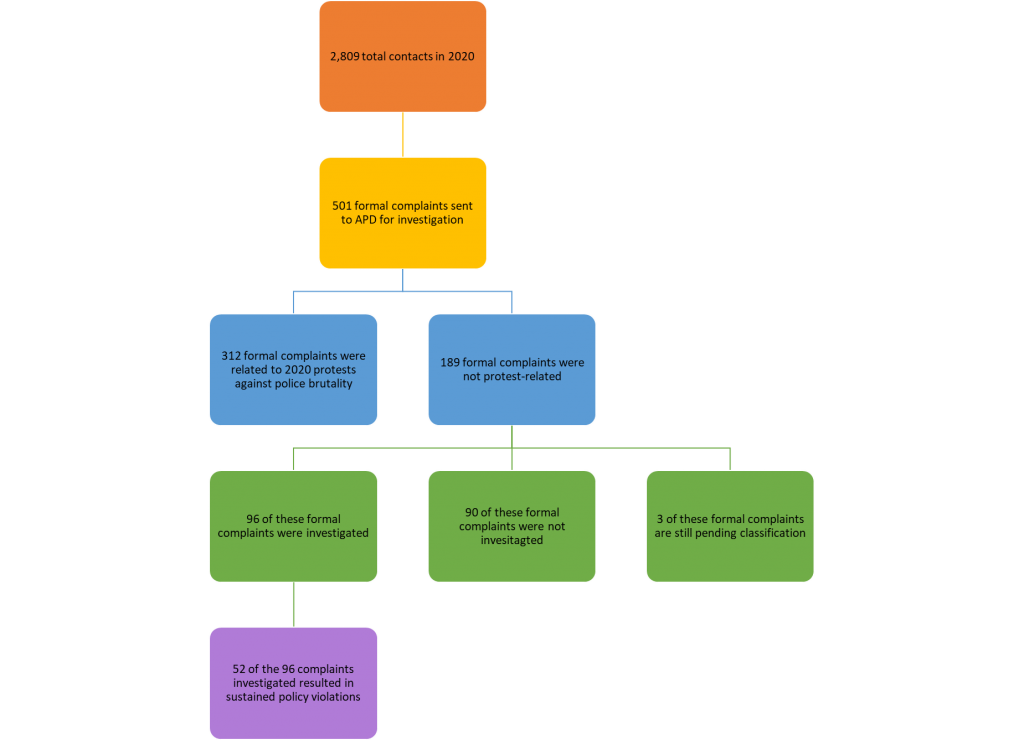
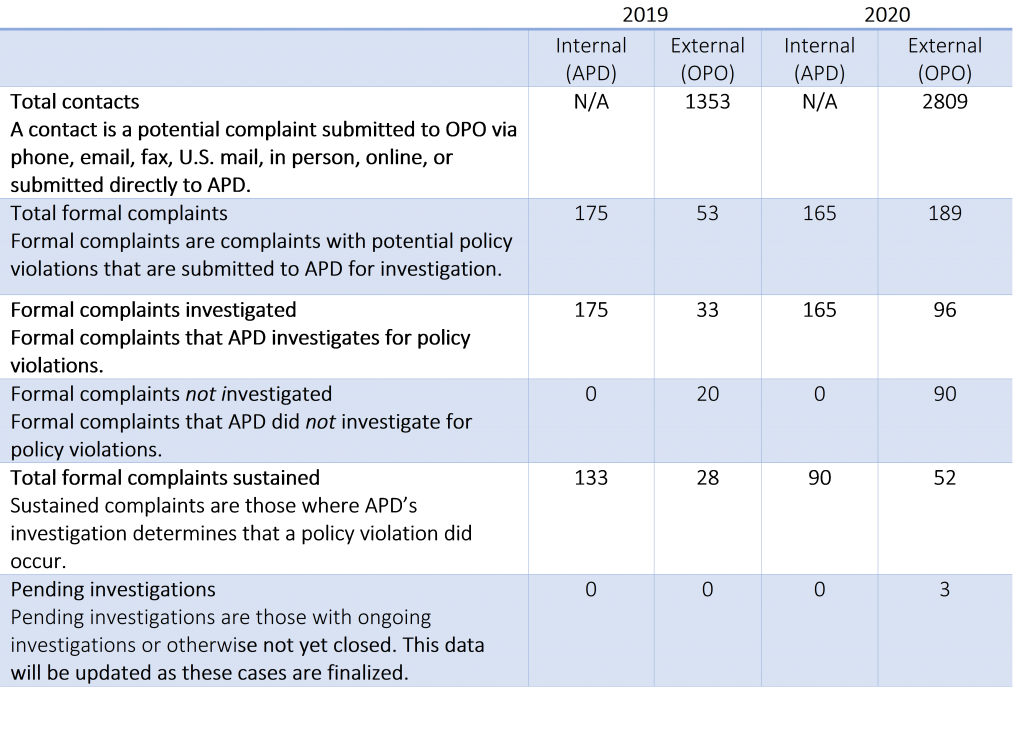
Complaints 6 of 8
What Types of Discipline Did APD Officers Receive?
Austin Police Department (APD) officers may receive discipline when an investigation reveals that they violated policy.
APD can issue discipline at any of the following levels:
- Indefinite suspension: An officer's employment with APD is terminated
- Temporary suspension: An officer is placed on leave for a specified number of days
- Demotion: An officer’s rank is lowered
- Written reprimand: An officer is disciplined in writing
- Oral reprimand: An officer is disciplined orally
- Education-based discipline: An officer is instructed to attend training as a part of the disciplinary action
OPO publishes all publicly releasable information related to APD discipline on our website.
Below are charts that describe the level of discipline APD issued in 2019 and 2020. Between 2019 and 2020, the number of APD officers disciplined decreased by 21%.
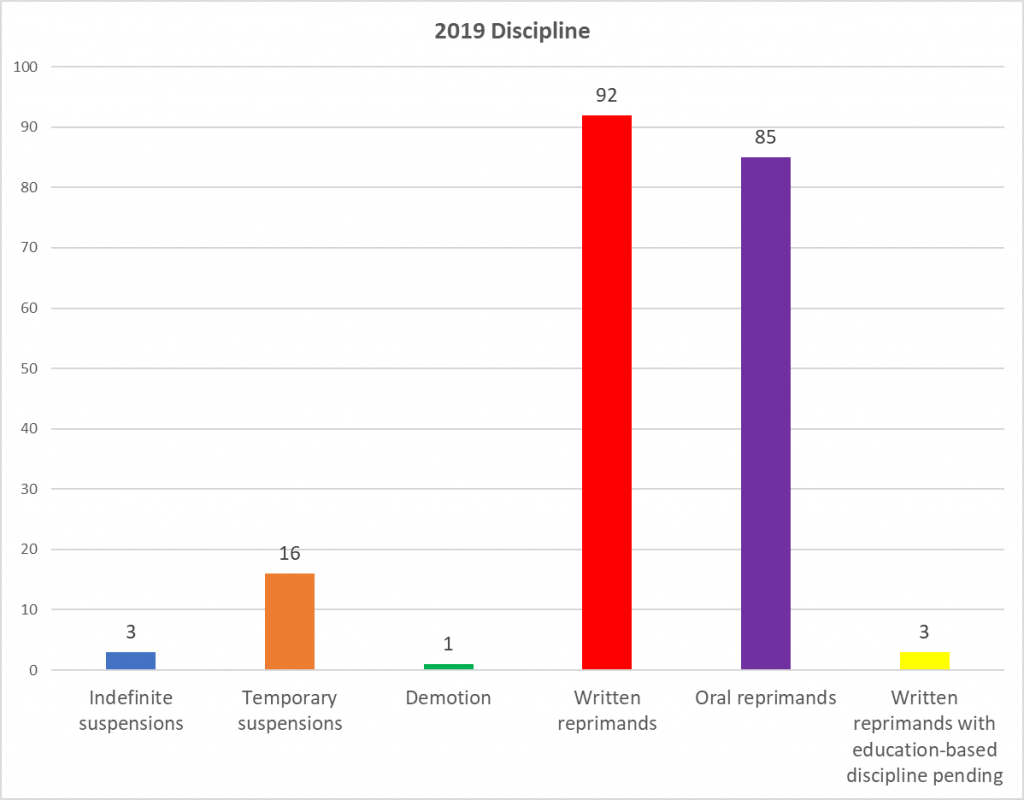
In 2019, 200 individual Austin Police Department officers received discipline. In some instances, an officer will be disciplined for more than one policy violation. During this period, officers were disciplined most often for violations of equipment policies, field operations and custody, response to resistance and pursuit, and field response and investigations and personnel policies.
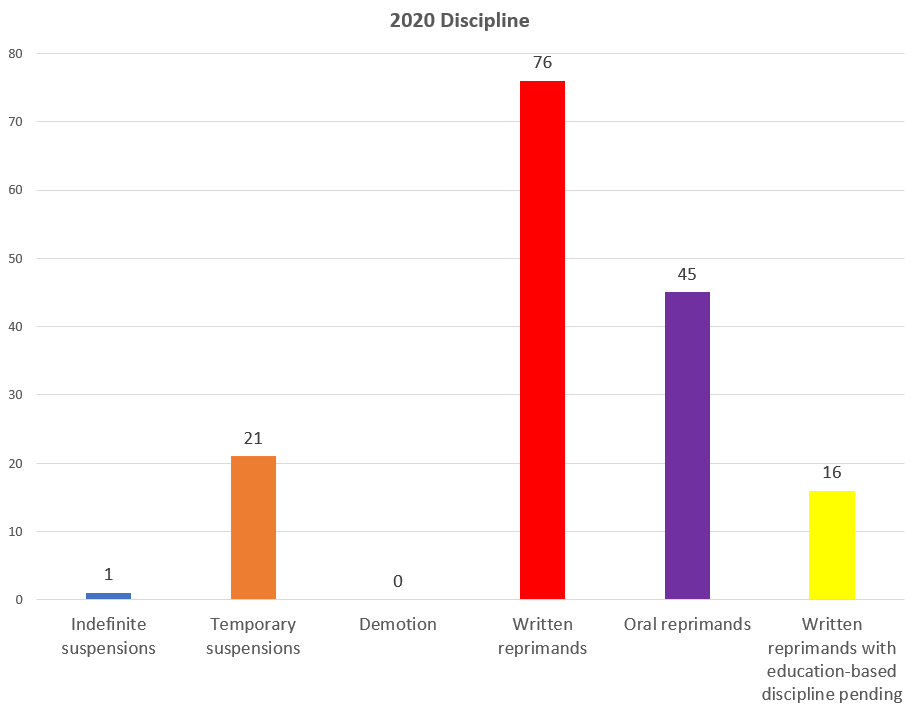
Retirements and Resignations Under Investigation
When an officer retires or resigns under investigation, it halts the investigation and discipline process.
- In 2019, two officers retired or resigned under investigation
- In 2020, 11 officers retired or resigned under investigation
To see more data on discipline, see this table.
Complaints 7 of 8
OPO Objections Regarding Discipline
OPO published two objections to APD in 2020.
General Orders Objection: General Order 903
On April 8, 2020, OPO submitted an objection to March 16, 2020, changes made by APD to General Order 903. These changes reduced the discipline level for policy violations related to body-worn cameras and dash-camera systems. OPO objected to APD’s changes because they undermine the discipline process by downplaying significant policy violations. Click here (PDF, 733 KB) for the entire OPO objection.
Investigation and Discipline Objection: Notice of Formal Recommendations Related to Complaint #2019–1402
In October 2020, OPO published an objection and recommendations related to the investigation and discipline decisions regarding a community complaint. Once the investigation into this complaint was complete, and discipline had been issued, OPO made specific recommendations to APD supervisors to ensure fairness and accountability. Further, in response to issues that arose during the investigation, OPO made specific recommendations for how APD investigators could improve their interactions with community members while investigating complaints. Click here for the complete OPO objection.
Complaints 8 of 8
Why Are Some Complaints Not Investigated?
In 2019, APD did not investigate 43% of external community formal complaints. In 2020, this number rose to 45%.
These complaints from the community were closed without investigation for one of the following reasons.
Administrative Closure
For some complaints, APD determined that there was no policy violation. These complaints were administratively closed without an investigation. OPO does not concur with APD closing community complaints without investigation.
Officer Final Classification Agreement (OFCA)
The OFCA is an administrative process that allows a complaint to be closed without investigation depending on an officer's history and the nature of the policy violation. With an OFCA, APD has determined, without an investigation, that an officer violated policy. OPO has raised concerns about the use of the OFCA to close complaints without investigation.
Supervisor Referral-Minor Policy Violation
For other complaints, APD determined that an officer violated policy, but the violation was minor. After making this determination, APD handled these complaints with a Supervisor Referral-Minor Policy Violation (SR-MPV). The SR-MPV process was established by APD leadership in 2020, creating another way for an allegation to be closed without investigation. OPO and APD are often in disagreement about when to use the SR-MPV as a means of resolving complaints. It is OPO’s position that complaints from community members should be investigated.
Policy
Policy 1 of 6
Policy & Research Division
The policy and research division conducts rigorous academic, legal, quantitative, and qualitative research to:
- Recommend policy and training changes within APD
- Report clear and reliable information about APD data and other areas of public concern
- Object to APD practices that negatively impact transparency, accountability, or fairness
OPO believes that excellent policy is created with equal attention to research, formulation, and implementation. Additionally, OPO works to ensure an open line of communication between policymakers and the individuals or groups affected by those policies.
Research and analysis are critical to OPO's mission to enhance accountability and increase transparency. This Division reports on the issues that most impact community members’ interactions with APD. In some cases, these reports are based on patterns or trends that OPO has observed while processing and monitoring complaints. In other cases, these reports are written in response to specific direction from Austin City Council or the City Manager’s Office.
In 2019 and 2020, OPO began building a collection of recurring research reports. This includes a report analyzing APD’s racial profiling data and a separate report examining APD's officer-involved shooting incidents.
Policy 2 of 6
Joint Report: Analysis of APD Racial Profiling Data
In January 2020, the Office of Police Oversight (OPO) published its first report analyzing APD's racial profiling data.
OPO partnered with the City of Austin's Office of Innovation and the Equity Office to analyze data from 2015 to 2018. The purpose of this report was to examine how racial and ethnic groups in Austin experience motor vehicle stops. Data from this report revealed that police disproportionately stop Black/African American individuals and Hispanic/Latinx individuals. Additionally, APD vehicle stop data from 2018 revealed geographic disparities. Specifically, arrests were most concentrated on the east side of the city. In addition to highlighting disparities, this report offered recommendations to address areas of concern. Click here for the full report. In June 2020, Austin City Council called for this report to serve as a baseline for measuring the success of citywide efforts to eliminate racial disparities in motor vehicle stops, arrests, and searches. Click here for more information.
In February 2020, OPO, the Office of Innovation, and the Equity Office hosted an event to listen to and gather community feedback about the findings of the January 2020 report. At this event, 56 community members, 20 City of Austin employees, and 10 APD commanders and executive staff met to discuss the report. Community members shared their lived experiences of policing in Austin, perspectives on the data, and ideas to enhance accountability. Notetakers collected information shared during the event. Click here to view this information.
Between February and April 2020, OPO, the Office of Innovation, and the Equity Office synthesized community feedback from the event to draw out themes and offer recommendations based on new insights. In April 2020, the three offices shared these findings and recommendations with the City Manager’s Office. Click here (PDF, 937 KB) to view the full report and memorandum to the City Manager.
In April 2020, OPO, the Office of Innovation, and the Equity Office also published a supplement providing additional analysis of the reasons for the motor vehicle stops in 2018. The analysis revealed that most motor vehicle stops conducted in 2018 were due to moving traffic violations. The least number of stops was due to pre-existing knowledge, such as warrants. Notably, Black/African American individuals and Hispanic/Latinx individuals remained disproportionately overrepresented across the board.
In November 2020, OPO, the Office of Innovation, and the Equity Office released the second joint report analyzing APD's racial profiling data. This report examined data from 2015-2019 and revealed that racial disparity persisted and, in many cases, worsened. Additionally, as with the 2018 data, APD’s 2019 data revealed geographic inequality. Specifically, warnings and field observations were most concentrated on the city's west side, while arrests were most concentrated on the city's east side. The analysis was accompanied by recommendations to address concerning trends and improve data collection and reporting. Click here for the full report. As with the January 2020 report, this report will serve as a baseline for measuring the success of citywide efforts to eliminate racial disparities in motor vehicle stops. Click here for more information.
Policy 3 of 6
Officer-Involved Shooting Report
In June 2020, OPO published its inaugural officer-involved shooting report.
This report examined each officer-involved shooting incident that took place in 2018 and involved APD. The report's purpose was to analyze data and patterns related to these events and recommend areas for improvement. Click here for the full report.
OPO’s analysis revealed that all but one incident involved a mental health component. Additionally, the analysis revealed a disparate concentration of officer-involved shooting incidents affecting ethnic minorities and historically minority-majority areas of Austin. For example, of the 12 incidents that occurred in 2018, eight involved ethnic minorities. Additionally, each of the five fatal incidents caused by police involved ethnic minorities in central, east, or southeast Austin.
Policy 4 of 6
Education and Training Recommendation: The History of Police & Race in America
In March 2020, OPO recommended that the Austin Police Department (APD) add a course to the Training Academy about race relations and policing in the United States and Austin.
The course, titled The History of Police & Race in America, was developed in partnership with the University of Texas School of Law. The goal of the course is to provide historical context to interactions between APD officers and the communities they serve. Click here to read OPO’s recommendation and the course curriculum.
Policy 5 of 6
Policy Recommendation: Austin Police Department General Order 301.2 and General Order 900.3.4(c)
Rudeness complaints are some of the most common complaints that OPO receives.
In September 2020, OPO recommended updates to two policies related to these common complaints. OPO developed these recommendations after researching several comparable police departments' policies. This research showed that APD's policies were unclear and did not adequately address real-world situations. OPO’s recommendations included updated language to refine General Order 301.2 Impartial Attitude Courtesy, General Order 900.3.4(c) Personal Conduct, and the corresponding Discipline Matrix items related to these policies. These changes would align the Austin Police Department with national best practices, uphold equitable law enforcement standards, and establish accountability for police officers. Click here (PDF, 273 KB) to read OPO’s recommendations.
On October 22, 2020, APD adopted some of OPO's recommendations but failed to take steps to make sure these policy changes would be effective. Specifically, OPO recommended firm disciplinary measures to show the seriousness of officers being rude, unprofessional, or unfair during interactions with each other and community members. APD chose not to adopt these discipline recommendations, which undermines the policy recommendations that it did adopt.
In November 2020, OPO objected to the changes APD made General Order 301.2 Impartial Attitude and Courtesy and General Order 900.3.4(c) Personal Conduct. Additionally, OPO recommended that APD fully incorporate OPO’s September 2020 recommendations. Doing so would demonstrate to both officers and the community that APD takes these types of allegations seriously. Incorporating OPO’s recommendations would also demonstrate APD’s desire to reimagine its policies and align them with best practices. Click here (PDF, 1.1 MB) to read OPO’s objection.
Policy 6 of 6
What Role Does OPO Have in Reimagining Public Safety?
Reimagining Public Safety is the City of Austin’s multi-faceted approach for improving all aspects of public safety in Austin.
Through Reimagining Public Safety, the City of Austin is working to address issues like budget allocation, racial disparities in policing, use-of-force policies, and mental health response.
OPO has been given a significant role in Reimagining Public Safety. In June 2020, OPO was given specific research tasks related to Reimagining Public Safety when Austin City Council passed the following three resolutions:
- Resolution 20200611-50 (Resolution 50)
- Resolution 20200611-95 (Resolution 95)
- Resolution 20200611-96 (Resolution 96)
In 2021, OPO began developing analyses, recommendations, and community engagement efforts associated with the Reimagining Public Safety initiative. OPO's extensive work with Reimagining Public Safety will be included in the 2021 annual report.
Communications
Communications 1 of 7
Communications Division
Community partnerships are a cornerstone of the Office of Police Oversight's (OPO) mission and were critical to its founding.
Through community engagement, the OPO works to engage the community to prioritize equity, empathy, and direct connection. OPO engaged the community by hosting events, building partnerships with community organizations, increasing language access, and publishing accessible information about policing. In 2019, OPO attended 251 events. In 2020, OPO attended 76 events.
OPO has actively engaged community members to raise awareness about topics like:
- How to file complaints and thank yous
- What their rights are when interacting with officers
- How to voice their opinions about APD policies and procedures
Accessible Information About Policing in Austin
In March 2019, the Office of Police Oversight (OPO) launched a new website where individuals can submit complaints or thank yous for the Austin Police Department (APD). To increase accessibility, the online complaint form underwent detailed user accessibility testing to ensure it was easy to use. In addition, OPO's website is mobile-friendly, the content is searchable, and it is also translated into Spanish.
In addition to submitting complaints or thanks, OPO’s website houses the documents that OPO may make public. These documents include:
- Notices of Formal Complaints
- Reprimands and suspensions
- Policy and discipline recommendations
- Formal memoranda from the OPO Director
- APD responses to OPO recommendations and memoranda
- Published reports
In 2020, additional improvements were made to the website to make it easier to navigate. Community members can search documents by type, filter by date, and search by keyword, including officer name, APD policy, or type of discipline. This improvement enhances transparency by making it easier for community members to find the information they are seeking.
Language Access
Language access is a priority for OPO's education efforts. OPO developed the Know Your Rights video series to educate community members on their rights during police encounters. With the help of community volunteers, these videos were translated into 7 languages.
OPO also publishes information about how to file a complaint or thanks in 7 different languages. High-quality translations have been critical to OPO's outreach at community events like the Lunar New Year Festival, Austin Refugee Day Festival, and the Consulate General of Mexico's annual resource fair.
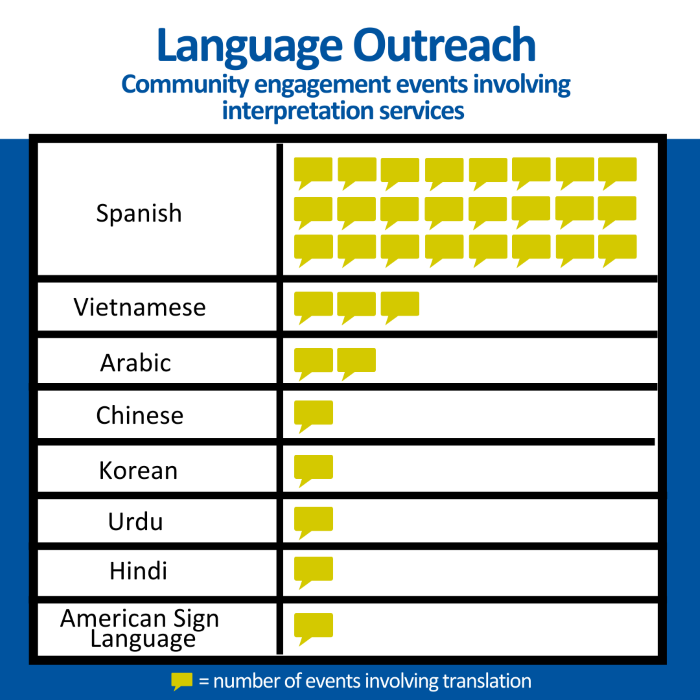
Police Oversight Advisory Working Group
After Austin City Council passed Resolution 201903220-47 in March 2018, the City Manager created the Police Oversight Advisory Working Group (Working Group). The purpose of the Working Group was to make recommendations to improve police oversight in Austin.
The Working Group analyzed data, evaluated best practices, and drafted a proposal for consideration by the City Manager and Austin City Council. The Working Group included representatives from a variety of stakeholders. Click here for more information on the Police Oversight Advisory Working Group.
Transition Advisory Committee
During 2019, OPO’s first year, the Transition Advisory Committee (TAC) provided feedback on critical initiatives, including community engagement, data analysis, and critical incident briefings. TAC was crucial to including and incorporating the community's voice in OPO and guiding our office toward growth and expansion.
Participation in the TAC included members from these diverse community groups:
- Asian American Quality of Life Commission
- Austin Justice Coalition
- Austin Police Association
- Council on American-Islamic Relations
- Greater Mount Zion Church
- Go Austin/Vamos Austin
- Measure Austin
- Neighborhood Housing and Development Corporation
- Undoing White Supremacy
Communications 2 of 7
Building Community Partnerships
According to OPO survey results and conversations with the community, the fear of retaliation is a significant barrier to filing reports with our office.
We recognize that fear and mistrust in policing and City government is a reality for some in our community. Our goal is to develop strategies to make our processes more accessible so that challenges and concerns can be properly addressed.
Building sustainable partnerships is at the forefront of our goal to earn community trust. OPO works to utilize focused outreach in a manner that is equity-minded, empathetic, and prioritizes direct connection with the community.

Equityspace Summit
On September 19, 2019, the Office of Police Oversight (OPO) contributed to the first-ever EquitySpace Summit. The event was a solution-focused conference about racial equity. It was designed to advance the national dialogue and inspire action.
OPO staff presented the session, “Engaging a Community in Fear: The Role of Community Engagement in Police Oversight.” The session focused on two key messages:
- The importance of generational and historical context to community fear of law enforcement; and
- How focused outreach can bridge the gap between communities and institutions.
Community Leaders
In February 2019 and November 2019, OPO hosted Community Leaders Breakfasts. At these events, OPO invited community members to learn more about OPO's work and connect with leaders throughout the community. Guests at these events included faith-based leaders, community organizers, nonprofit leaders, and educators.
Each Community Leaders Breakfast also provided a forum for community members to ask questions about policing and oversight. In addition, OPO used community members’ February 2019 feedback to develop OPO's mission statement. Click here to read OPO’s mission statement.
Community Office Hours
OPO approaches community engagement intending to meet people where they are. In 2019, OPO followed this approach by hosting community office hours in neighborhood libraries and recreational centers. These office hours enabled OPO to connect with communities across 19 different locations in all 10 City Council districts. OPO outreach focuses on historically underserved communities and those experiencing barriers to access. In this photo, two OPO staff members sit at a table, ready to answer questions from shoppers at the H Mart food court in North Austin.

Communications 3 of 7
Know Your Rights Video Series
OPO created a video series to educate the community on their rights when interacting with law enforcement.
OPO created the “Know Your Rights” initiative to educate the community on their rights when interacting with law enforcement. This initiative includes a series of videos and presentations on two topics:
- Know Your Rights: The Right to Remain Silent
- Know Your Rights: For Immigrants
Because language access is a top priority for OPO's education efforts, OPO, with the help of community volunteers, translated the videos into seven languages.
Click here to view the videos.
Communications 4 of 7
Feedback Reports From Community Events
On February 22, 2020, the Office of Police Oversight (OPO), the Equity Office, and the Office of Innovation hosted an event to listen to and gather community feedback about the findings of the January 2020 report.
At this event, 56 community members, 20 City of Austin employees, and 10 Austin Police Department (APD) officers met to discuss the report. Community members shared their lived experiences of policing in Austin, perspectives on the data, and ideas to enhance accountability. Notetakers collected the information shared during the event. View a spreadsheet with this information.
Afterward, OPO, the Office of Innovation, and the Equity Office synthesized the information and provided it to the City Manager’s Office. View the full report and memorandum to the City Manager.
Communications 5 of 7
Critical Incident Briefing Videos
On June 1, 2020, APD added a policy regarding the public release of critical incident videos involving police officers.
The OPO was influential in developing this policy and meeting with the community to get input and feedback.
Critical incidents are defined as:
- Officer-involved shootings, including unintentional discharge, while in the course of duty or response to a call, regardless of whether a person was hit by gunfire and even if no allegation of misconduct is made.
- A use of force resulting in death or serious bodily injury as defined by Section 1.07, Texas Penal Code
- All deaths while an arrestee/detainee is in the custodial care of the Department
- Any other police encounter where the Chief of Police determines the release of video furthers a law enforcement purpose.
The policy says that APD will publish video footage of police-related critical incidents to inform the community in a timely fashion. The policy also states that APD will consult and seek feedback from OPO during the production of the video for public release.
At the time of publication, APD has released three critical incident videos to the public, with OPO conducting oversight of the process. Click here to view these videos.
Communications 6 of 7
OPO Community Engagement During the COVID-19 Pandemic
The COVID-19 pandemic led the City of Austin to take precautions to protect health and safety.
As a result, in-person community engagement events were discontinued. However, OPO was committed to sharing our work and continued to communicate with the community through our newsletters and social media. OPO newsletters include:
- Office updates
- Upcoming events
- Community resources
- Links to our reports
Since August 2019, OPO has sent out 12 newsletters and grown our audience by 341 subscribers.
Communications 7 of 7
Community Police Review Commission
On September 10, 2020, the City of Austin announced the first members of the newly formed Community Police Review Commission (CPRC).
The CPRC is a group of volunteers appointed by the City Manager as another tool for accountability and transparency in policing. Commissioners can:
- Make policy-level recommendations regarding discipline, training, community relations, and the Office of Police Oversight's (OPO) complaint process
- Address any other issues of concern by the community
- Review patterns and practices of the Austin Police Department (APD)
- Assess critical incidents and review individual cases of police misconduct
- Make fair and objective recommendations, and make decisions based only on the facts and evidence
- Assess the effectiveness of OPO
Since October 2020, Commissioners have held virtual meetings open to the community on the first Monday of every month. During their meetings, they have received presentations from OPO, the Community Video Review Panel (a group of community members chosen to review APD training videos), the Equity Office, and community organizations.
The CPRC developed a mission statement to listen to and promote the community's voice in policing and public safety in Austin. The CPRC encourages conduct, practices, and policies that support dignity and equity.
As part of its role, the CPRC has also identified various areas of policing to research and provide recommendations for improvement. All formal letters of recommendation, meeting recordings and agendas, and presentations can be found on the Commission's website click here.
